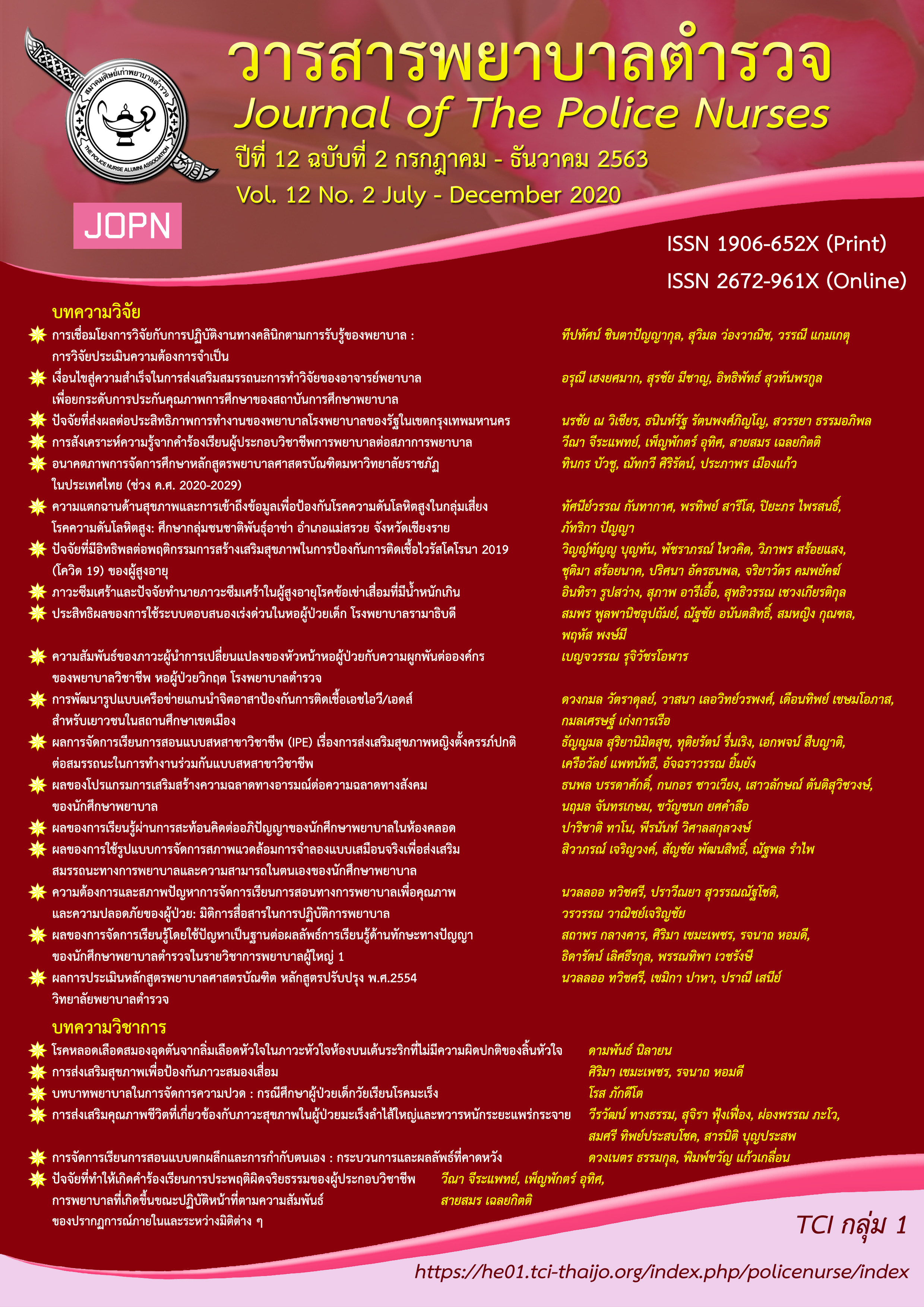THE EFFECT OF USING A VIRTUAL SIMULATION ENVIRONMENTAL MANAGEMENT MODEL TO ENHANCE NURSING COMPETENCY AND SELF-EFFICACY OF NURSING STUDENTS
Keywords:
virtual simulation model, environmental management, nursing competency, self-efficacyAbstract
The purposes of this quasi-experimental research were descripted the effect of using a virtual simulation environmental management model to enhance nursing competency and self-efficacy of nursing students. The samples were 60 nursing students divided into 2 groups. The experimental group (n = 30) and the control group (n = 30) were chosen by simple random sampling. Research instruments were a virtual simulation environmental management model and an achievement test that had KR-20 at .77. The performance skill test was validated for content validity by 5 experts and received the content validity index equaled to .80. The self-efficacy questionnaire was compiled by Suparat Jamghang (Jamghang, 2018) that had the Cronbach's alpha coefficient at .82. Data were analyzed using mean, standard deviation and t-test.
The research findings were as follows: the average scores of the knowledge of the experimental group had lower than the control group, it was not statistically significant (p=.157), the average scores of the performance of the experimental group had higher than the control group, it was statistically significant (p=.000) and the average scores of the self-efficacy of the experimental group had higher than the control group, but it was not statistically significant (p=.054).
The research results indicateก that virtual simulation environmental management model can enhance nursing competencies.
Downloads
References
Bamodu, O., & Ye, X. M. (2013). Virtual reality and virtual reality system components. Advanced Materials Research, 7(5), 1169-1172.
Bandura, A. (1997). Social learning theory. New York, NY: General Learning Press.
Binstadt, E. S., Walls, R. M., White, B. A., Nadel, E. S., & Takayesu, J. K. (2007). A comprehensive medical simulation education curriculum for emergency medicine residents. Annals of Emergency Medicine, 49(4), 495-504.
Chaemchang, S., Yomdit W., & Phetphit, B. (2018). The effect of preparedness for nursing practice by using virtual simulations on perceived competency in nursing practice on the ward. Journal of Nursing Ministry of Public Health 27, 46-58.
Decker, S., Sportsman, S., Puetz, L., & Billings, L. (2008). The evaluation and its contribution to competency. Journal of Continuing Education in Nursing, 39(2), 90-96.
Gaba, D. M. (2004). The future vision of simulation in health care. National Library of Medicine, 13(1), 2-10. doi:10.1136/qhc.13.suppl_1.i2
Hallmark, B. F., Thomas, C. M., & Gantt, L. (2014). The educational practices construct of the NLN/Jeffries simulation framework: State of the science. Clinical Simulation in Nursing, 10(7), 345-352.
Jefferies, P. R. (2005). A framework for designing, implementing, and evaluating simulations used as teaching strategies in nursing. Nursing Education Perspectives, 26(2), 96-103.
Kerdruang, A. (2017). Promoting learning in the 21st century to support Thai society in the digital age. Journal of Lampang Rajabhat University, 6(1), 173-184.
Kingsawat, K. (2013). Integration of information literacy instruction at primary education level in a virtual learning environment (Doctor of philosophy program in information studies). Faculty of Humanities and Social Science Khon, Kaen University, Khon Kaen.
Rujkorakarn, D. (2014). Summary report of the educational management in nursing for the 21st century conference. 12 - 13 February 2014. Saraburi: Boromarajonani College of Nursing.
Sangboonraung, W. (2016). Synthesis of virtual learning environment models on the web based on constructivist theories for promoting critical thinking of undergraduate students. Nakhon Phanom University Journal, 6(1), 43-51.
Suwankiri, W., Chulamisi, O., & Tangkhawanwanit, T. (2016). Learning management by using simulation for nursing students. Journal of Nursing Chulalongkorn University, 28(2), 1-14.
World Health Organization (WHO). (2016). Nurse educator core competencies. Geneva: The WHO Document Production Services.
Downloads
Published
How to Cite
Issue
Section
License
ผลงานที่ได้ตีพิมพ์แล้วจะเป็นลิขสิทธิ์ของวารสารพยาบาลตำรวจ















